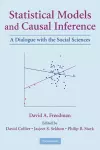
Statistical Models and Causal Inference
David A Freedman - Paperback
£44.00
David A. Freedman (1938–2008) was Professor of Statistics at the University of California, Berkeley. He was a distinguished mathematical statistician whose theoretical research included the analysis of martingale inequalities, Markov processes, de Finetti's theorem, consistency of Bayes estimators, sampling, the bootstrap, and procedures for testing and evaluating models of methods for causal inference. Freedman published widely on the application - and misapplication - of statistics in works within a variety of social sciences, including epidemiology, demography, political science, public policy, and law. He emphasized exposing and checking the assumptions that underlie standard methods, as well as understanding how those methods behave when the assumptions are false - for example, how regression models behave when fitted to data from randomized experiments. He had a remarkable talent for integrating carefully honed statistical arguments with compelling empirical applications and illustrations. Freedman was a member of the American Academy of Arts and Sciences, and in 2003 he received the National Academy of Science's John J. Carty Award, for his 'profound contributions to the theory and practice of statistics'. David Collier is Robson Professor of Political Science at University of California, Berkeley. His current work focuses on conceptualization and measurement and on causal inference in qualitative and multi-method research. He is co-author of Rethinking Social Inquiry: Diverse Tools, Shared Standards and co-editor of two recent volumes: The Oxford Handbook of Political Methodology and Concepts and Method in Social Science. A central concern of his research is with the contribution of detailed case knowledge to causal inference and concept formation. Jasjeet S. Sekhon is Associate Professor of Political Science at University of California, Berkeley. His current research focuses on methods for causal inference in observational and experimental studies and evaluating social science, public health, and medical interventions. Professor Sekhon has done research on elections, voting behavior, and public opinion in the United States; multivariate matching methods for causal inference; machine learning algorithms for irregular optimization problems; robust estimators with bounded influence functions; health economic cost effectiveness analysis; and the philosophy and history of inference and statistics in the social sciences. Philip B. Stark is Professor of Statistics at University of California, Berkeley. His research centers on inference problems, focusing on quantifying the uncertainty in inferences that rely on numerical models of complex physical systems. Professor Stark has done research on the Big Bang, causal inference, the US census, chemical spectroscopy, earthquake prediction, election auditing, food web models, the geomagnetic field, geriatric hearing loss, information retrieval, Internet content filters, nonparametrics, the seismic structure of the Earth and Sun, and spectrum estimation. He has served as an expert witness on statistics for government and industry in state and federal courts.